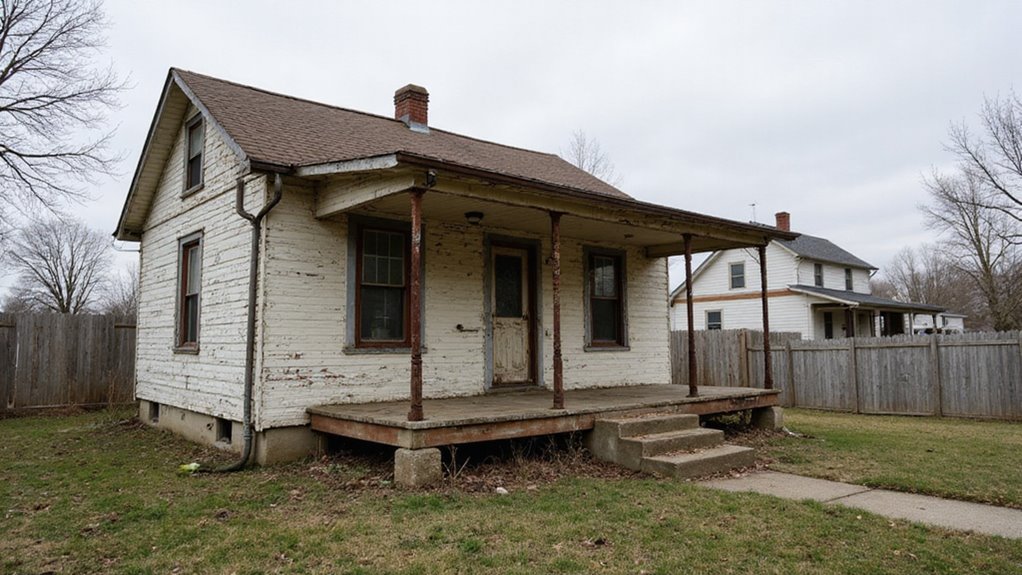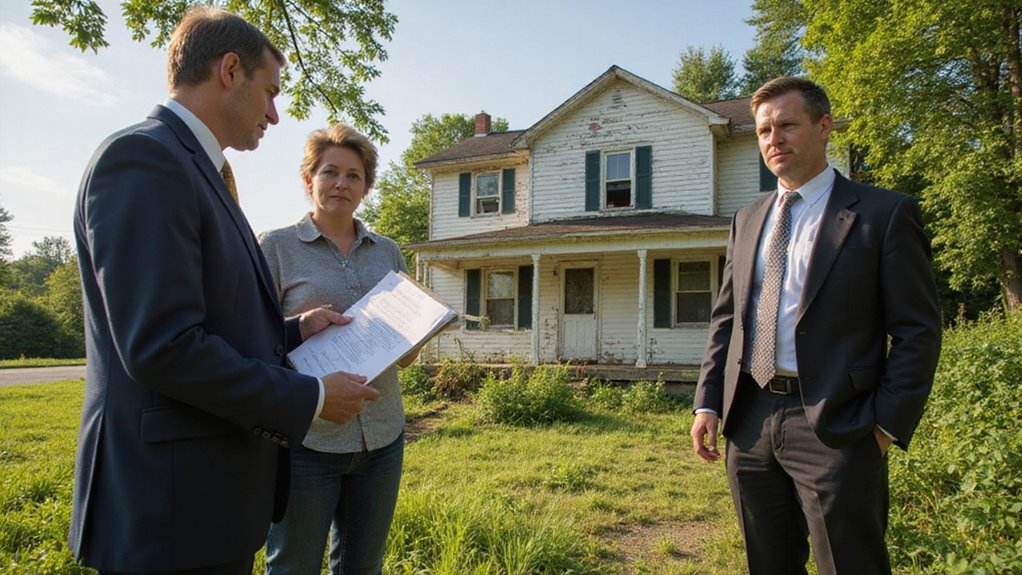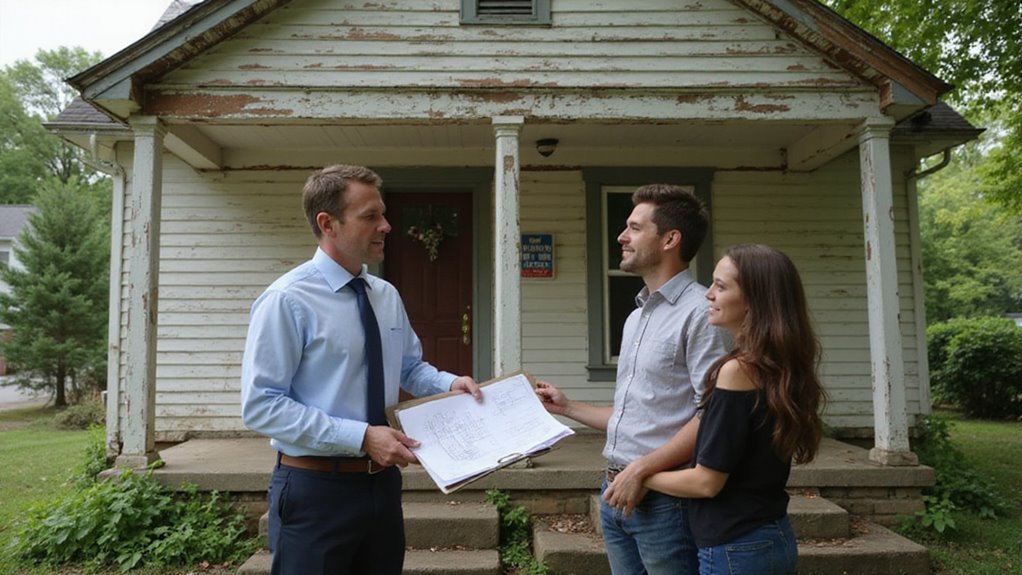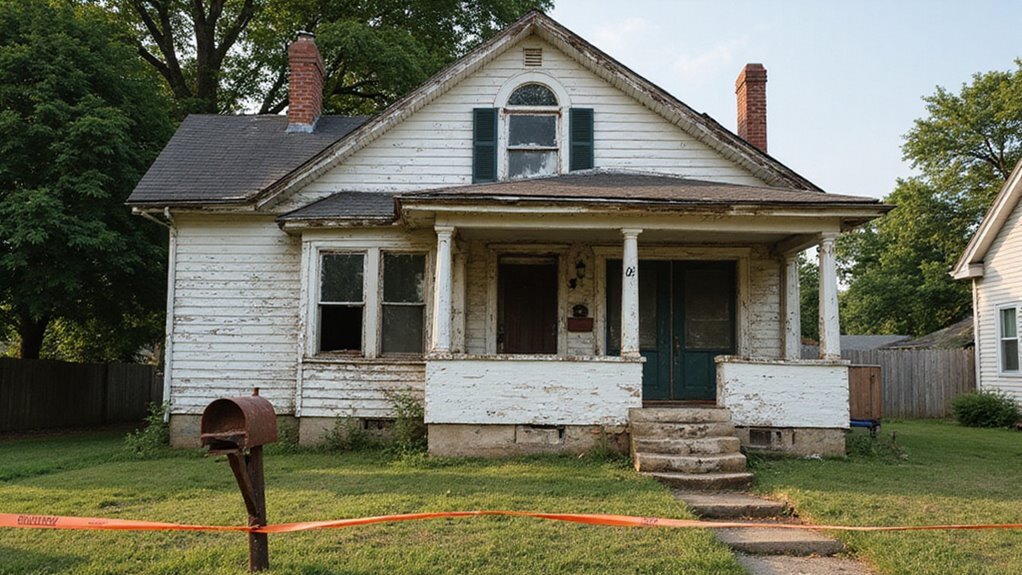Selling a house in Kentucky can be stressful if your property has code violations. Many homeowners worry that problems like faulty wiring or structural issues will make selling impossible. These concerns are common, especially if you need to sell fast or inherited a problematic home.
Unresolved code violations can scare off buyers or reduce your home’s value. Some buyers may walk away, while others might demand costly repairs. It is easy to feel overwhelmed by the rules and possible penalties if you hide these issues.
Yes, you can sell a house with code violations in Kentucky, but you must disclose all known problems to buyers. This means you need to be honest on the Kentucky Seller’s Disclosure of Property Condition form.
Following the right steps can help you avoid lawsuits or fines. This blog will guide you through selling your Kentucky home even if it has code violations.
Key Takeaways
- Yes, you can sell a house with code violations in Kentucky, but you must fully disclose all known issues on the Seller’s Disclosure Form.
- Selling “as-is” is permitted, meaning buyers accept responsibility for existing code violations after the sale.
- Failure to disclose code violations can lead to legal actions, including lawsuits for fraud or misrepresentation under Kentucky law.
- Code violations usually lower a property’s value and may limit buyer interest or access to traditional financing.
- Most buyers for homes with violations are cash investors, flippers, or buyers willing to handle repairs themselves.
Understanding Code Violations in Kentucky

A code violation in Kentucky means your property does not meet state or local safety rules. These rules set standards for building, maintenance, and living conditions. Breaking them can cause problems when selling your home. For example, issues like selling as-is are common for homeowners dealing with code violations, especially if you want to avoid repairs before listing.
Kentucky laws like KRS Chapter 198B cover building codes. Local city rules address things like sanitation and security. If you do not follow these rules, you may get cited.
Code enforcement officers check properties for compliance. If they find violations, you may get fines or face legal action. These violations can also change your property taxes and affect neighborhood safety.
Knowing the laws helps you avoid surprises. If you fix violations before selling, you protect your investment. You also help keep your community safe.
Proper documentation and disclosure of code violations is legally required in Kentucky, ensuring transparency and helping you avoid potential legal issues during the sale.
Common Types of Code Violations Found in Homes
Home inspectors often find certain code violations in Kentucky homes. These include problems with electrical wiring, plumbing, and building permits. If you know what these common issues are, you can avoid them. Common Kentucky home code violations include electrical, plumbing, and permit issues—knowing these can help you avoid costly mistakes.
Outdated wiring or unapproved electrical work break state building codes. Improper plumbing, such as poor venting or illegal setups, also causes violations. If a renovation lacks the right permits, it may not meet safety standards. If you are unsure how much repairs will cost, getting an accurate estimate from a professional can help you decide your next steps.
Zoning violations happen if land use does not match local rules. For example, turning a garage into a living space without approval is not allowed. Unapproved extra buildings on your property can also lead to citations.
Missing safety items like smoke detectors or handrails is a common problem. If these features are not installed, you could be fined. Local codes and Kentucky laws require these safety measures.
If you are struggling to sell a property with code violations, you may want to consider cash home buyers who purchase houses in any condition and can offer a fast, hassle-free sale.
How Code Violations Are Discovered

You’ll typically encounter code violations through municipal inspections, which local authorities conduct under Kentucky Revised Statutes Chapter 198B. Buyers also uncover issues during their own home inspections, a standard part of the real estate transaction process. Both methods can lead to official reports that may require you to address violations before closing.
In some cases, inspectors may also identify mold problems during their assessments, which can impact your property’s value and require professional remediation before a sale. Additionally, if your property has suffered from structural damage, this can be a significant factor in code violations and may further complicate the selling process.
Municipal Inspections and Reports
Municipal inspections in Kentucky help find property code violations. These inspections protect your investment and are needed for legal compliance. You may need an inspection if you plan to sell or maintain your property.
Local officers check properties by law. They often do this during routine neighborhood surveys under Kentucky Revised Statutes Chapter 381. Inspections can also happen if someone files a complaint about your property.
Permit applications can trigger inspections too. If you apply for a repair or renovation permit, officials may check for past violations. Knowing these triggers can help you avoid penalties before selling.
Buyer’s Home Inspection
After municipal inspections, the buyer’s home inspection checks for hidden problems in your home. A licensed inspector looks for code violations or safety issues. If the inspector finds anything, the buyer can ask for repairs or a lower price.
Kentucky law says you must tell buyers about any defects you know. Inspectors may still find more issues that you did not know about. These new findings can affect the buyer’s ability to get a mortgage.
Many lenders will not approve loans for homes with serious code violations. Buyers might use renovation grants or special loans, like the FHA 203(k), to pay for repairs. If there are no major problems, the buyer can move forward with a regular loan.
If the inspection finds code violations, the buyer may ask you to fix them or lower the price. Major safety concerns could cause the buyer to withdraw or demand repairs. If no big issues are found, the sale can continue as planned.
The Impact of Code Violations on Property Value
Code violations usually lower a property’s value. If a home has code issues, buyers will often offer less money. Repair costs, safety concerns, and legal risks all influence these offers. Appraisers may value your home lower if it does not meet building codes. Lenders might refuse financing or insist on repairs before closing. This limits the number of buyers who can purchase your property.
Unresolved violations can also make it harder to obtain specialized vacant property insurance, which may further deter potential buyers. If you ignore code violations, you may lose money when selling. Fixing problems before listing can help protect your investment. Considering repairs early often leads to better offers. Addressing building code compliance proactively not only helps avoid penalties but also increases your chances of attracting qualified buyers.
Disclosure Requirements for Kentucky Home Sellers

Kentucky law requires home sellers to disclose any code violations. Sellers must fill out a Seller’s Disclosure of Property Condition Form. This form also covers structural problems and unpaid property taxes.
If you do not share this information, you could face lawsuits or financial penalties. Code violations may also lower your home’s appraised value. This can affect whether buyers get approval for financing. Identifying existing liens early can also be crucial, as they may impact the sale process alongside code violations.
You must report all known issues, even if they are minor. Full honesty helps you follow state law and avoid future disputes. Accurate disclosures make the sale process smoother for everyone.
In addition, Kentucky law requires sellers to disclose known mold or water damage issues, as failing to do so can result in legal penalties and undermine buyer trust.
Selling As-Is: What It Means for Kentucky Homeowners
When you sell your Kentucky home “as-is,” you’re offering the property in its current condition, with no obligation to make repairs under KRS § 371.010. Buyers assume responsibility for any code violations or issues once the sale closes, which increases their risk. However, state law still requires you to disclose known defects, so you can’t withhold information about code violations.
It’s also important to note that proper documentation and compliance with local laws are essential when selling a property with code violations, especially if the property is part of a probate estate. If you need to sell quickly, you might consider cash buyers, as they often provide a streamlined process for homes with code violations.
Defining As-Is Property Sales
Selling your Kentucky home “as-is” means you transfer it in its current state. You do not have to fix any problems or make improvements. This is allowed by Kentucky law, but you must tell buyers about known defects.
If you sell as-is, you are not responsible for repairing code violations before closing. The buyer agrees to take the home with all its issues. You must list these issues in a disclosure statement.
The sale price usually matches the home’s current condition and the local market. Homes with problems often sell for less money. Understanding these rules helps protect your legal rights and set clear expectations.
Buyer Responsibilities and Risks
Buying a Kentucky home “as-is” means you take on all risks and responsibilities. You will be responsible for any repairs or code violations after closing. Kentucky law does not require sellers to fix problems before the sale.
Code violations or zoning issues can lead to fines or enforcement from local authorities. If you ignore these issues, you could face higher property taxes. You should always check historical zoning rules before making changes to the property.
Public records may show past violations or restrictions. If you have questions, a real estate attorney can help explain your duties. Careful research ensures you know your legal and financial obligations before buying.
Disclosure Requirements for Sellers
Sellers in Kentucky must follow specific disclosure rules. State law requires you to tell buyers about material defects and code violations. This applies even if you sell the property “as-is.”
You must complete the Seller’s Disclosure of Property Condition form. This form should list all known code violations. If you fail to do this, you may face legal problems.
A written statement is needed if you sell “as-is.” This should make clear that the buyer accepts the property’s current condition. If you have made repairs or updates, you must disclose them.
Always include details about repairs related to safety or building codes. If you are unsure about a defect, it is better to disclose it. Honest disclosure protects you from future disputes.
Buyer Types Interested in Properties With Violations
Properties with code violations in Kentucky mainly attract investors, flippers, and cash buyers. These buyers are comfortable with repairs and legal issues. They do not rely on traditional loans. Real estate investors often buy such homes at lower prices. They fix the violations and resell for a profit. If you own a home with violations, investors may offer you a quick sale.
House flippers look for code issues they can fix fast. They prefer problems that are not too costly or complex. If your property’s violations are minor, flippers may be interested. Cash buyers are important because banks rarely finance homes with code problems. These buyers can close deals quickly with their own funds. If you need a fast sale, cash buyers are a good option. Many sellers in Shelbyville are drawn to no-obligation, all-cash offers because they can avoid agent commissions, repairs, and lengthy listing processes when selling properties with code issues.
Kentucky laws, like KRS 198B and zoning rules, affect these sales. Buyers must understand these laws before purchasing. If a buyer is familiar with local codes, the sale process is smoother. For homeowners who want to sell as-is, working with cash buyers or investors makes it possible to avoid the hassles of traditional real estate transactions.
Negotiating Repairs and Credits With Buyers

When negotiating with buyers, you’ll need to address who pays for repairs, whether you’ll offer a credit at closing under KRS 382.135, or if you’ll sell the property as-is. Kentucky law requires full disclosure of known code violations, so buyers may request credits or repairs as part of their terms.
Clear agreement on these points is essential to avoid post-sale disputes and ensure compliance with all legal obligations. To further protect both parties, it’s important to review any legal documentation related to the property and ensure all disclosures and agreements are properly recorded.
Repair Cost Responsibility
In Kentucky, sellers are not always required to pay for all repairs. The law does not force sellers to fix every problem. Responsibility for repair costs is usually decided through negotiation.
Sellers must disclose known problems under Kentucky Revised Statute § 324.360. If buyers ask, sellers can choose to fix issues or offer a price reduction. Some local rules may force repairs, especially for safety or zoning violations.
Major code violations, like environmental hazards, can stop a sale. Sellers should address these first if negotiations require it. If unsure, a real estate attorney can help explain your options.
Credit at Closing
A credit at closing is a way to handle code violations when selling a home in Kentucky. The seller offers the buyer money at closing instead of fixing the issues. This credit covers the estimated cost of repairs.
The amount is usually based on contractor estimates. The credit is included in the purchase agreement to protect both the buyer and seller. If you use this option, you must follow Kentucky law and disclose all known code violations.
Buyers can use the credit for repairs or other costs, such as property taxes. Always consult a real estate attorney to write the agreement correctly. This helps ensure the process is fair and legal.
As-Is Sale Agreements
An as-is sale agreement lets you sell your Kentucky home without making repairs for code violations. You must still tell buyers about known issues. Kentucky law (KRS 324.360) requires full and honest property disclosures.
Buyers need to know about any problems, like environmental hazards or zoning restrictions. If you sell as-is, buyers take the property with all current violations. You are not required to fix anything but must share all facts.
Most buyers may ask for a lower price or a credit to cover repairs. You should be ready to talk about these options. If you keep clear records, you protect yourself and help the sale go smoothly.
Working With Real Estate Agents Experienced in Code Issues

Working with a real estate agent who knows code issues helps you sell a house with violations in Kentucky. These agents understand how code violations affect property prices. They can guide you on fair pricing based on your home’s condition.
Agents familiar with Kentucky Revised Statutes (KRS 324.160) know what disclosures you must make. They help you follow state rules, which lowers your legal risks. If you need advice, they can explain your obligations in simple terms.
An experienced agent will help you manage city rules and paperwork. They often know contractors who can estimate repair costs if you want to fix problems. If you decide to sell as-is, the agent can find buyers open to this option.
Choosing the right agent increases your chance of a smooth and legal sale. Their expertise makes the process easier, even if your house has code issues. If you want to reduce stress, working with a specialist is a smart choice.
The Role of Home Inspections in the Selling Process
Home inspections are important when selling a house in Kentucky. Inspectors can find code violations that may affect your sale. Kentucky law requires you to tell buyers about known problems.
An inspection can show issues you did not know about. Inspectors help buyers decide how much to offer. If inspections find problems, buyers may want repairs or a lower price.
If you fix code violations, you can avoid legal trouble. Pre-inspections can speed up the process and build buyer trust. Your agent can guide you on what to do next.
Potential Legal Risks of Not Disclosing Violations
If you do not tell buyers about known code violations when selling your Kentucky home, you risk legal trouble. Kentucky law (KRS 324.360) says sellers must fill out a Property Disclosure Form. This form requires you to list any material defects or code violations.
Buyers can sue for fraud or misrepresentation if you hide problems. Courts may order you to pay damages or even undo the sale. If a buyer finds out about hidden issues after closing, you could face serious consequences.
Federal laws like the Real Estate Settlement Procedures Act (RESPA) also require honesty in real estate deals. These rules exist to protect both buyers and sellers. You should always disclose all known problems to follow the law and avoid legal risks.
Navigating Municipal Fines and Liens
You must pay any municipal fines or liens on your Kentucky property before you sell it. If these debts are unpaid, cities can delay or block your sale. Kentucky law lets cities enforce these liens.
A city may place liens for unpaid fines, code violations, or broken neighborhood rules. If you owe money, request a payoff statement from the city. This statement lists all fines and fees you owe.
If you want to save money, try to settle your debt before closing. Some cities may lower penalties if you pay quickly. Always ask if a discount is possible.
Once you pay, make sure the city files a lien release. The release proves you cleared the debt. Without this, you cannot transfer a clear title to the buyer.
Steps to Take Before Listing a Home With Violations
You can sell a Kentucky home with code violations, but you must follow certain steps first. Begin by getting a full inspection to find all violations. This will help you know what needs fixing.
Contact your local building department to learn which violations must be fixed under Kentucky law (KRS Chapter 198B). Some issues may need immediate attention before selling. Minor repairs can raise your home’s value and attract more buyers.
Gather repair estimates and collect all necessary disclosure forms. Kentucky law (KRS 324.360) requires you to inform buyers about any known problems. Proper disclosure can prevent legal troubles later.
If you are unsure about the process, speak with a real estate attorney. A lawyer can review your listing and contracts for compliance. Careful preparation will help you avoid delays and make the sale smoother, even with some violations.
Resources and Assistance for Kentucky Homeowners
Kentucky homeowners can get help to fix code violations and maintain their homes. The state and local groups offer several support programs. These resources make home repairs and legal compliance easier.
Kentucky Housing Corporation (KHC) offers grants and low-interest loans for repairs. KHC programs often help with projects to meet code rules. Homeowners should check if they qualify before applying.
Counties have community development offices with advice on code issues. These offices can guide you to local repair programs. Contact your local office if you need help understanding code requirements.
Legal Aid of the Bluegrass explains property laws to homeowners. This group can help you talk to code officials or understand your rights. If you need legal advice, contact them for support.
Conclusion
If you want to sell a house with code violations in Kentucky, you must follow legal requirements. Sellers should always disclose any known problems and keep good records. If you do this, you can avoid legal trouble and possible fines.
If you do not want to handle repairs or long negotiations, there are other options. We buy houses for cash, even if there are code violations or other issues. This can make the sale faster and less stressful for you.
If you are ready to sell, OC Real Estate can help you with a fair cash offer. We handle all paperwork and make the process easy. Contact us today to learn how we can help you sell your house quickly and simply.

